Public Relations Ethics and the Facebook and Cambridge Analytica Scandal
⌛ By Kaylin R. Staten ⌛
When you first created your Facebook account, you probably didn’t think your information would be compromised. You were focused on talking to your friends and family, collecting the flair (throwback to the OG Facebook days) and cyberstalking an ex’s new significant other.
Fast forward to today, where data breaches are a dime a dozen and Facebook is at the helm of another controversy.
It’s no secret than analytics make any communications professional’s world go ‘round. After all, public relations and other communications professionals use demographics and psychographics to create messaging that in turn reached intended internal and external publics. We look at click-through rates (CTR), write for Search Engine Optimization (SEO) and pay attention to consumer trends.
However, there is an extreme difference between conducting honest, ethical research, such as an up-front survey about the product your company is selling, and masquerading as a personality quiz to collect user information to be sold for a firm's potential political purposes.
No matter your political opinion, you should be concerned about the Facebook and Cambridge Analytica breach. Some people have been so off-put by it that they have deactivated and deleted their entire Facebook accounts. Some firms are pulling advertising left and right. Of course, as many of us know (and especially those in technology industries), nothing ever really goes away on the Internet. Your always data lives somewhere.
What is the main takeaway from this debacle? For communications pros, it’s simple: Be ethical in everything you do.
Both parties are at fault in this scenario.
First, Facebook.
Mark Zuckerberg, and Facebook in general, is considered an opinion (or thought) leader — not to mention a mass medium. Facebook showcases positive, negative and neutral opinions from all over the digital world, as well as our in-person lives. It uses the agenda-setting theory to set the stage for public discussion and the media-dependency theory to help mass audiences formulate ideas that they may or may not have experience or expertise in.
While making changes to privacy settings in 2014 and afterward were positive steps, remaining silent about the breach when it occurred was not in good taste. A public relations professional serves as the moral compass for the C-Suite and beyond, so any Facebook leader or communicator’s prior knowledge of this breach, if applicable, is unethical if it isn’t communicated to all affected target audiences (in this case, the millions of people affected by the breach). Also, a crisis communications plan is essential in communicating to angry publics, despite making promises to those whose data were affected.
Here’s his response, a little too late, in our opinion.
Second, Cambridge Analytica.
A communications firm should know better. End of story. It's unethical if anyone poses as something they’re not and then sells the information to a firm for any financial or other gains under false pretenses. It's unethical for the firm to accept and potentially use that information. If smear campaigns and other propaganda strategies and tactics are used, it doesn't just reflect on a firm's reputation. It also affects the client roster and anyone associated with someone who conducts business and communications in that way.
But, kudos to Cambridge Analytica for making organizational changes, starting from the top.
Not all PR pros are like this, though. Some of us wouldn't dream of making the decisions leading to this breach and subsequent fallout. According to the Public Relations Society of America (PRSA) Code of Ethics, PR practitioners should practice honesty, adhering to “to the highest standards of accuracy and truth in advancing the interests of those we represent and in communicating with the public.” Many professional communications membership organizations have their own Codes of Ethics; while there are some variables, most of the core values are the same.
Below is the PRSA Code of Ethics' Disclosure of Information Clause:
DISCLOSURE OF INFORMATION
Core Principle: Open communication fosters informed decision making in a democratic society.
Intent: To build trust with the public by revealing all information needed for responsible decision making.
Guidelines:
A member shall:
- Be honest and accurate in all communications.
- Act promptly to correct erroneous communications for which the member is responsible.
- Investigate the truthfulness and accuracy of information released on behalf of those represented.
- Reveal the sponsors for causes and interests represented.
- Disclose financial interest (such as stock ownership) in a client’s organization.
- Avoid deceptive practices.
Examples of Improper Conduct Under this Provision:
- Front groups: A member implements “grass roots” campaigns or letter-writing campaigns to legislators on behalf of undisclosed interest groups.
- Lying by omission: A practitioner for a corporation knowingly fails to release financial information, giving a misleading impression of the corporation’s performance.
- A member discovers inaccurate information disseminated via a website or media kit and does not correct the information.
- A member deceives the public by employing people to pose as volunteers to speak at public hearings and participate in “grassroots” campaigns.
Having a PR role automatically comes with the responsibility to adhere to trust and integrity with messaging and how your overall business and communications efforts are executed. While a violation of communications ethical codes does not result in serious ramifications, time will tell whether laws were broken in this situation. One thing is certain: trust and public opinion related to both organizations are shaken.
The true lesson? Don’t take Facebook quizzes. And be careful what you put online and what you give sites and apps access to do with your personal information.
Copyright © MMXVIII Hourglass Omnimedia, LLC
Kaylin R. Staten is an award-winning public relations practitioner and writer. She owns Hourglass Omnimedia, a consulting company based in Huntington, WV.
⌛ ⌛ ⌛
